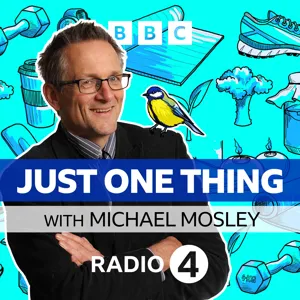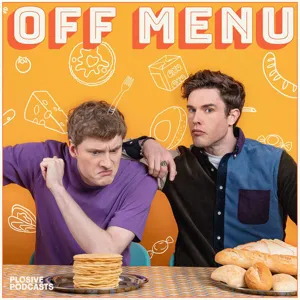Podcast Summary
Weight loss support from PlushCare and the benefits of eating an apple a day: PlushCare offers doctors for weight loss journeys and can prescribe FDA-approved medications. Apples, eaten daily, provide heart health, cognitive function, and weight loss benefits through flavonoids.
For those struggling with weight loss, PlushCare can be a helpful solution. This telehealth provider offers doctors available around the clock to assist in weight loss journeys and can prescribe FDA-approved medications like Wegovy and Zeppound for qualified individuals. Additionally, LinkedIn is a valuable resource for small business owners looking to hire professionals, as over 70% of LinkedIn users don't visit other leading job sites. Regarding health and well-being, eating an apple a day is a simple yet effective way to improve mental and physical health. Apples are rich in flavonoids, which can benefit heart health and cognitive function. These compounds have been linked to improved blood pressure, weight loss, and even a longer life. For those with textured eating challenges, like Lee Chambers who is autistic, finding ways to enjoy the sensory experience of apples can be key. Stay tuned to "Just One Thing" podcast by doctor Michael Mosley for more tips on improving health and life in unexpected ways.
Apples: More Than Just a Sweet Snack: Apples, especially with skin, offer numerous health benefits including reduced blood pressure, improved blood health, cancer prevention, gut health, cholesterol reduction, and weight loss.
Apples, especially when eaten with the skin, offer numerous health benefits. Apples are a rich source of vitamin C, minerals like potassium, and fiber. However, it is the skin of the apple that contains the majority of these nutrients, including flavonoids, which are antioxidants that have been shown to reduce blood pressure, improve blood health, and even help fight cancer in laboratory studies. Apples also contain prebiotics, a type of fiber that feeds the good bacteria in the gut, helping reduce inflammation and improve overall health. Additionally, eating apples daily has been linked to reduced cholesterol levels and weight loss. Despite the challenges of eating apples with the skin, such as texture, it is recommended to try incorporating them into meals or finding ways to make them more palatable, such as combining them with cheese. Overall, apples are a simple and delicious way to improve your health and meet your daily fruit intake goals.
Apples with skin offer greater health benefits: Eating apples with skin increases nitric oxide production, lowers cholesterol, reduces inflammation, improves diabetes management, and lowers risk of cardiovascular and cancer mortality.
Eating apples with the skin provides greater health benefits compared to eating apples without the skin. This is because the skin of apples contains flavonoids, which are essential plant compounds that protect the apple from stressors like sunlight and disease. In turn, these flavonoids offer similar protective effects in humans, increasing the production of nitric oxide, a molecule that regulates blood pressure and maintains blood vessel health. Studies have shown that eating an apple with its skin leads to improvements in blood pressure and blood vessel function, as well as lower cholesterol, reduced inflammation, and improved diabetes management. Additionally, consuming a daily intake of 500 milligrams of flavonoids, which can be achieved through foods like apples, tea, oranges, blueberries, and broccoli, is associated with a lower risk of cardiovascular and cancer mortality. Overall, the skin of apples is not just a barrier but a valuable source of essential nutrients that contribute to overall health and wellbeing.
Apples: A Brain-Healthy Food with Numerous Health Benefits: Apples, rich in fiber and flavonoids, enhance gut health and reduce risk of vascular dementia. Cooking doesn't destroy their flavonoids, making them a versatile addition to meals and snacks.
Apples offer numerous health benefits due to their high fiber content and various beneficial compounds, including flavonoids, potassium, vitamin C, and vitamin E. Consuming both fiber and flavonoids together enhances their effects on the gut microbiome, increasing the presence of beneficial bacteria and decreasing harmful bacteria. Apples have been linked to a reduced risk of vascular dementia, making them a brain-healthy food. While there are variations in flavonoid content among apple varieties, cooking apples does not destroy their flavonoids. Apples' versatility makes them an excellent addition to various meals and snacks, offering a simple yet effective way to improve overall health.
Exploring the Impact of Art and Culture on Lives and Careers: Engaging with art and culture can inspire us, improve our health, and enhance our lives through meaningful experiences and discoveries. BBC Radio 4's podcast 'This Cultural Life' offers insights into the lives of creative figures, while UnitedHealthcare provides flexible health insurance plans, and Quince offers affordable, ethical fashion.
Engaging with art and culture can have profound impacts on our lives and inspire us to create and grow. BBC Radio 4's new podcast series, This Cultural Life, invites leading creative figures to discuss the key moments and cultural works that have shaped their careers. From actors like Kenneth Branagh to artists like Tracy Emin, each episode offers insights into the lives of those we admire and the art that drives them. Meanwhile, taking care of our physical health is just as important. For instance, giving our eyes and minds a rest can improve vision and eye health, as well as boost mood, concentration, and memory. And for those in need of short-term health insurance, UnitedHealthcare offers flexible, budget-friendly plans with access to a nationwide network of doctors and hospitals. Lastly, Quince provides high-quality fashion at affordable prices, with a commitment to safe, ethical, and responsible manufacturing. By embracing art, culture, and quality fashion, we can enhance our lives in meaningful ways. Subscribe to BBC Sounds for more episodes of This Cultural Life, and visit Quince.com/style for your next fashion find.






